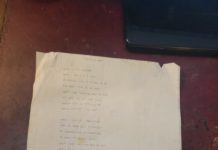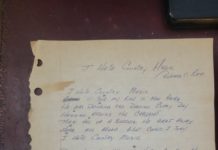I promised, in the entry titled: “Just Keep Walking”, that I would come back with a long-form essay that would attempt to wrap a little bit of context around what I mean when I say that my father was a rolling stone before being a rolling stone was cool; with all that I learned about him from his own mouth, and all that I discovered in his writings after his death, I accept that the truth of his legacy is that he was one of the most reliably unreliable people I have ever known.
His first marriage produced two children(I’m the youngest). That was followed by a long-term relationship that produced three more, and his relationship career ended with his second marriage to a wonderful lady (Joanne), who I got to know quite well and from whom he was estranged for the better half of the 20 years it lasted before he died.
Across two marriages and a long-term relationship, a total of five children to show for it, he will be forever remembered, most of all, for heading out the door to run a quick errand – and not showing up again for days or weeks at a time. On the one hand, it’s sad that a human life can be summed up in two words – reliably unreliable – but it can be simultaneously knee-slapping hilarious if you are comfortable enough in your own skin to love someone despite their flaws and imperfections because you’re all too familiar with your own.
After my father’s funeral, gathering with the people wanting to pay their respects at a crab house in northeastern Maryland, it was Joanne who brought us all together in laughter to appreciate the man, including, most of all, his faults and shortcomings when she told us a story I will probably still be laughing about when I’m laying in my own death bed… However far down the road, that might be for me. He had come into the living room, excited as she said he always was every time he got some hair-brained idea in his head about something he wanted to do. He asked her if she had $20 and told her he needed to make a quick run to the store, but he’d be back soon.
She dug in her purse and handed him the money but held tightly to it as she looked him in the eyes and said, “I need a gallon of milk and a pack of cigarettes, and don’t you dare forget them.”As she was telling the story, she looked over at me with a big grin on her face as she said loud enough for everyone else to hear,” And that was the last time I saw that son of a bitch for eight days.”
At that point, of course, we’re all starting to snicker and chuckle a little bit, and just like a stand-up comedian reading her crowd, she raised her voice so the whole restaurant could hear her and asked us: “When the mutherfucker finally did show up, wouldn’t you know it that he didn’t have milk or cigarettes or my fucking change?” We all laughed so hard that even total strangers, just there trying to eat their crab in peace, were laughing right alongside us as if it was the funniest damn thing anyone had ever heard. And this is the larger point here; people who knew him and loved him anyway understood this about him and never considered this behavior as something that needed to be forgiven… It was just accepted… And we all knew not to give him cash unless we didn’t need it back anytime soon.
After a solid week of kicking around some of the pieces of my father’s life, it finally hit me over coffee this morning that the only way to get this story right is to embrace just how much like him I grew up to become. After coming to terms with that and confronting the reality that – as easy as it is in life to project your shortcomings onto others – literally every problem in life is ultimately of our own making. Go ahead… Argue with me, yell at your screen, and then take a long, hard look at yourself and ask, seriously, how much control of your life you have and how much of it have you handed over to someone else or some other thing? I’ll wait.
As I put this essay together, forcing myself to seek out memories long buried or intentionally pushed aside, what I found as I “went there” was the reminder that everybody has a story about their parents or their childhood, or some of the fucked up pieces of our lived lives that seem a whole lot different in the retelling than any of it was as we lived through them, for better or worse. And to put a finer point on this, offering the most drippingly delicious irony I can muster, it was my father – of all people – who once said to me, near the end of his life, “You could be the best parent that ever lived, David. You could be the author of every number one best-selling “how to” book on parenting ever published, and your kids will still wind up being fucked up and crying with Oprah on TV.”
I mentioned my parents in one of the essays contained in my recently published collection (on Amazon) in the first volume of Hermit Chronicles, describing them this way: “…I found myself thinking back to the loved ones that have since passed, my mother and father in particular, and all the others who knew their deaths were imminent but were no longer able to articulate how well they felt they had done in their lives or how far they felt they had gotten toward checking off any of the items on their own bucket lists. I can say with certainty that neither of my parents got very far… big ‘D’ dreamers, little ‘a’ achievers, they were… although they were certainly never lacking for the next big idea they wanted to go chase after”.
At the time of her passing, my mother had been long lost inside her own head, but she was happy in there and content that there were no demons left to fight. She was truly and completely at peace with herself and the world around her. This was not the case with my father.
I had sat with him at his bedside, as I had done with my mother in her own final days, and watched him suffer through excruciating pain, each day fighting against my taking him to the hospital. We both knew that trip would be his last, and he fought against it until he was too weak to stop me from picking him up and carrying him to the car. As we talked over those last few days (the few times he was coherent enough to), I watched a man, still fighting demons he refused to admit had long ago defeated him, never giving in all the way up to his dying breath. There’s something heroic in that, but there’s also something gut-wrenchingly sad just beneath the surface.
It seems to me that, by our very nature as a species, we are going to do good things and bad things, make good choices and terribly unwise choices, and before we’re dead, we are going to have done bad things to good people and good things to bad people. Along the way, we will both succeed and fail and both please and disappoint, and sooner or later, we are going to look back at our parents, hoping to blame them for one or more of our own foibles even long after they have passed. It doesn’t make it right, but it certainly makes it normal.
I didn’t even meet my father until I was in my 30s, yet by the time he died, I came to understand that we were, more or less, the very same person, which can only be attributed to the luck of the DNA draw. And it certainly reminds me, at least, that I can no more blame my parents for what they did or didn’t do than I can forgive myself for how well or poorly I dealt with the things that came along across the entirety of my life’s journey that I never had any control over, to begin with, any more than anyone else that has ever been born or lived or died. I am at peace with that and so, too, should the rest of you be.





